By Gussie Coulter
For Alexis Gauthier, the protests outside his restaurant, Gauthier Soho, were becoming more than simply “annoying”. The vehemently anti-foie gras crowd that gathered each Tuesday was growing in numbers by the week – from ten, to fifty, to one hundred – and was becoming detrimental to his business of fine dining. Enough was enough; Alexis needed to do something.
“Okay, I’m going to talk to them,” he decided.
Following a long conversation, the crowds subsided, and Alexis went home. The next day – to the shock of his colleagues – he made the executive decision to cease the sale of foie gras. For a “hardcore” French chef such as Alexis, this was a Rubicon moment no less. From this 2014 culinary manoeuvre drastic change precipitated: Alexis soon became vegan and, following a protracted animal phaseout, so did Gauthier Soho. He is now a prominent campaigner for animal rights and an Instagram veganism advocate. Upon discovering his content, and being genuinely moved by it, I knew I had to meet him.
As I ascended the long staircase of the regency style former townhouse – led by Gauthier Soho’s own sommelier – I caught glimpses of dining room glamour I had only seen on film. As we approached Alexis’ office at last, I reflected – with a certain journalistic cynicism – on my goal of gaining insight into his journey and career. Who was I kidding? What I really sought was moral persuasion…
As I entered his office, he greeted me warmly, and so the interview began.
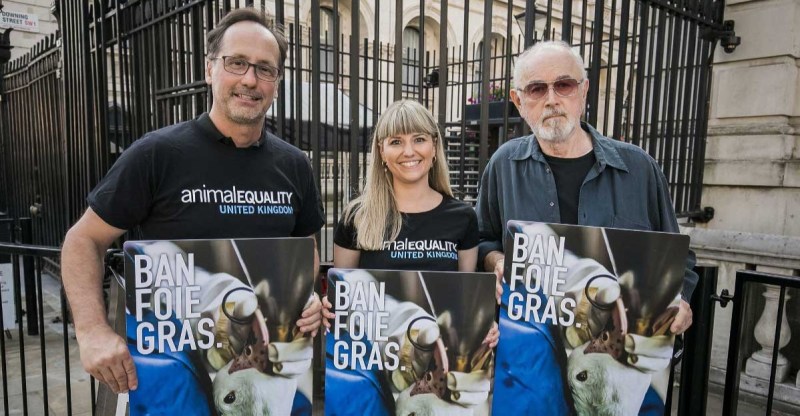 Alexis (left) pictured outside Downing Street campaigning for a foie gras import ban. Image credit: Animal Equality UK
Alexis (left) pictured outside Downing Street campaigning for a foie gras import ban. Image credit: Animal Equality UK
Hailing from Avignon, a town in the south of France, the culinary profession was not inevitable for Alexis. “In my family nobody was a chef or remotely involved in restaurants,” he tells me. However, Alexis “used to love eating”, and the nature of the southern French cuisine – being “based around vegetables” – left a lasting imprint. The possibility of placing vegetables and fruits at the centre “was the first grain that was planted in my head in terms of looking at vegetables as a way to feed myself”, Alexis explains. A creative rather than a moral force.
Upon graduating from hotelier school, Alexis was told that “in order to be a good hotelier, you need to be a good chef” and so was sent to Hotel Negresco – the “best hotel in Nice”, located on the Promenade des Anglais – to develop his culinary expertise. “I loved it so much,” Alexis reflects. Having found his home in the kitchen, he abandoned his prior pursuit and set out to become a chef full time.
Following a brief stint working under Alain Ducasse in Monaco, Alexis opened his first restaurant, Roussillon, in Pimlico in 1998. With it, he launched London’s first vegetarian tasting menu. The restaurant’s namesake, located in Provence, was home to the plant-oriented cuisine that had long inspired Alexis. So, alongside the conventional French menu, Alexis “wanted to have something that was a little bit more out of the ordinary”.
The possibility of placing vegetables and fruits at the centre “was the first grain that was planted in my head in terms of looking at vegetables as a way to feed myself”
“That wasn’t a marketing exercise,” Alexis notes. In 1998 “the more the press talked about it, the less people wanted to come and try us… we wanted to tell customers we had beef, lamb, scallops, langoustines, you know?” Alexis chuckled. Roussillon won its Michelin star in 2000.
Alexis then opened Gauthier Soho in 2010. Whilst it was “the natural thing to do”, the transition from the “sleeping area” of Pimlico to the “crossroads of Soho” was a “big thing”, Alexis explains. His radicalism was never stifled by culinary norms and, as Gauthier Soho incorporated ever more plant-oriented elements to its menus, it became the first Michelin-starred establishment to feature calorie counts on its menu.
In 2013, a portent of revelations on the horizon, Alexis published “Vegetronic”, a “flexitarian” cookbook in which animals “would never be the stars of the dish”. It served as yet another outlet of his creativity with vegetables. Despite this, however, his plant focus was still not ethically motivated: “Although I had been inspired by vegetables… I never really thought about the animals, and how they were part of my list of ingredients… just like a kilo of sugar.”
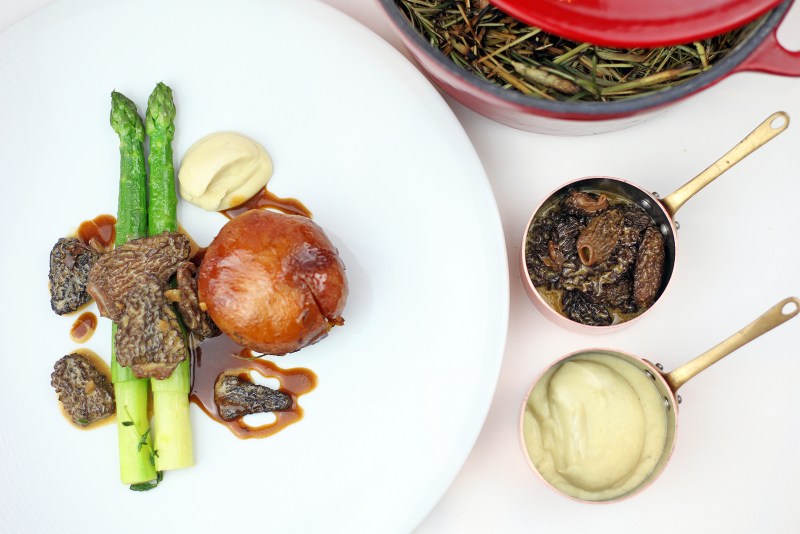 Alexis has long centred his creativity on vegetables. Image credit: Gauthier Soho
Alexis has long centred his creativity on vegetables. Image credit: Gauthier Soho
When the London Vegan Action Group crowds mounted outside his restaurant in 2014, Alexis had his “eyes opened to animal welfare”. At his parley with the vegans, they explained to him how “foie gras is one of the most atrocious things you can inflict onto a duck or a goose.” Gavage, the torturous process of force-feeding by which foie gras is produced – to fatten the goose liver – had been effectively outlawed by UK animal welfare regulations, but the import of foie gras was still legal.
I was keen to explore this apparent eureka moment – was his decision borne of previous sentiments, or a moment of sudden realisation? “I didn’t realise,” Alexis told me, “I saw.” The facts, the pictures and the reality of the suffering geese moved Alexis beyond mere contemplation – “I couldn’t believe I had ignored this for most of my life.” There was no question as to what Alexis should do.
Gauthier Soho, the home of “the best foie gras dish in London”, a beacon of traditional haute cuisine, and yet a subtle plant innovator, had finally acquired a conscience. To counteract the backlash, Alexis created a ‘faux gras’. It was “very successful, but never as good as the foie gras”.
This encounter was a “ray of light” for Alexis. “I started to think about the condition of animals and how, as a chef, I was impacting their world,” he tells me. By shear chance, he came across a book, ‘Antispéciste’, by French journalist Aymeric Caron. In this “philosophical grenade”, Alexis was exposed to speciesism – a concept Caron dubs the “Original Sin of domestication” – the purported human supremacy over animals, and philosophical reduction of their subjects to Cartesian soulless automatons. Humanity had rationalised this slave-master relationship.
Traditional haute was not hot. It was repressive and abusive.
As Alexis closed the book, the moral imperative was clear: “that’s it… I cannot eat animals anymore… and I need to stop profiting from their birth and death.” Alexis subsequently announced to his staff that Gauthier Soho would be entering a “transitionary period” within which a new creative approach would be taken; future dishes would not feature animal products, and menu items with animal products would be phased out.
“That’s it… I cannot eat animals anymore… and I need to stop profiting from their birth and death”
During the pandemic – at which point only scallops and seabass remained to be eliminated from the menu – his restaurant subsisted on sales of cook-at-home boxes. With the vegan boxes outselling the meat options eightfold, Gauthier Soho went all the way and emerged from lockdown fully vegan.
Whilst not the motivating factor, the popularity of his vegan options and his pre-existing fascination with the vegetable helped facilitate the transition. With reference to the origin of the virus, Alexis also notes how there “wasn’t a better time [than the COVID outbreak] to realise we were playing with fire in terms of our relationship with animals”. Whilst he explains – with a tinge of sadness – that he had lost the majority of his original customer base, effective promotion filled his seats with new, open-minded guests who appreciated his hybridisation of authentic French cuisine and vegan innovation.
The virtue of Alexis’ veganism lies in its twofold nature: selflessness and simplicity. “We do it for the animals,” he tells me, placing environmental and health concerns in the backseat. “You can’t stop a life for three minutes of pleasure – that’s just abnormal.” With an almost Benthamite simplicity, Alexis’ veganism is not the product of abstract philosophical reasoning, but a straightforward and intuitive response to the empirical reality of animal suffering.
The Cambridge Declaration on Consciousness, Alexis tells me – which asserts unequivocally the conscious experience of nonhuman animals – is evidence enough and should, quite naturally, give rise to the abhorration of the plight of Earth’s farmed animals. Turning the pessimism on its head, it also highlights their capacity for joy. People should realise that “a piglet would like to love, to hope, to live, and to be with the family just like us,” Alexis tells me. “I don’t believe any argument can be won against what we say,” he explains, “I’m for life – are you for death?”
“A piglet would like to love, to hope, to live, and to be with the family just like us… I don’t believe any argument can be won against what we say”
There appears a striking intellectual dissonance between Alexis, and the vast meat-eating population, which must have some level of awareness of the scale of animal suffering; 2022 YouGov polling indicates that half of Britain’s vegans face some level of disapproval or hostility from family members. Clearly, such intuition is not widespread.
“The vegan in the family is always the odd one out,” Alexis says, frowning – “it is a problem.” His own veganism had, at times, been subject to apathy, or worse – disapproval. Despite this, Alexis is strong in his conviction that veganism is simply a matter of intelligence and good intuition: “If you know, and you do not change,” Alexis tells me, with a solemn honesty, “then you are either a moron… or you are a monster”.
The utterance, in its piercing clarity, struck a chord I had not known existed.
“If you know [about animal suffering] and you do not change, then you are either a moron… or you are a monster”
Given the evident moral and emotional weight of Alexis’ change in perspective, I wondered how psychologically affected he was during the transitionary phase, whilst his principles were at odds with his method of profit. “That was heartbreaking… it was a very tough time,” Alexis confessed, “I was still a bit of a strange person in my own restaurant.” His hard-working employees questioned the apparent insanity of his abandonment of all that conventional French haute cuisine stood for – along with the massive business risk. “I regret not having done it before,” Alexis reflects with a sad look in his eyes, “so in everything I do now, I try to buy back the time”.
The “silver lining”, was that Alexis was able to leverage these moral demands to usher in a new era of culinary creativity. He had wanted to become a “grand chef français” and in doing so, had been “formatted” by the codified, almost religious, tradition of Auguste Escoffier; “you had to stick to the rules,” he explained. Now he was free.
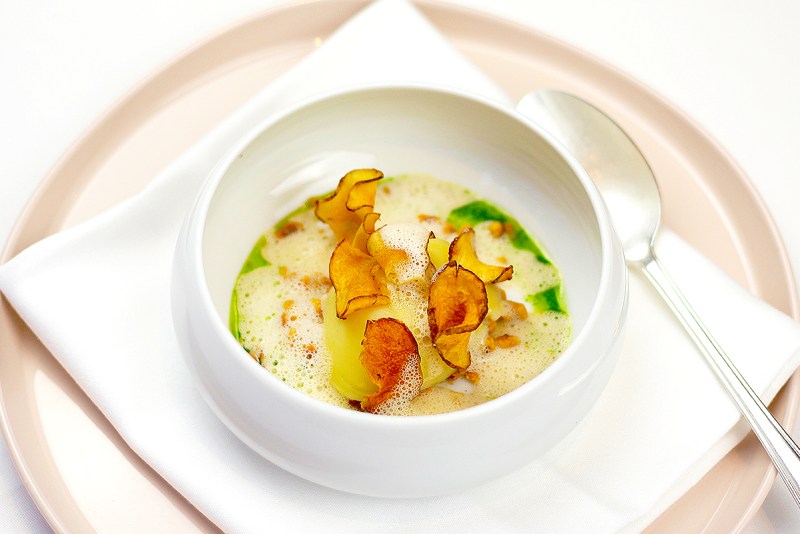 Gauthier Soho still uses the seasons as a guideline. Image credit: Gauthier Soho
Gauthier Soho still uses the seasons as a guideline. Image credit: Gauthier Soho
“There was no road I couldn’t take,” Alexis tells me, with excitement: “There was no reason I couldn’t put aubergine in a pudding, or strawberry in a main course.” The beauty of his cuisine lies not only in its transcendence of the French status quo, but in its simultaneous grounding in tradition – he still uses the ingredients around him, and the seasons as a guideline. “It wasn’t even a window opening – it was a French door,” Alexis says with a grin, “I very often compare it to discovering a new planet.” In the absence of rules, there was no creative risk.
After years spent in this new gastronomic arena, I wonder – what creation was Alexis most proud of? “Our kelp caviar,” he tells me”. “It tastes like the sea and is flavoured like caviar eggs,” Alexis reflects warmly, and “no sturgeons lost their lives… you know?” He believes it tastes better than the real thing, and its international success is testament to that. From utilising the curry poulet herb – a leaf that tastes like roast chicken – to his creation of a vegan flan parisien, Alexis operates on the frontiers of fine dining.
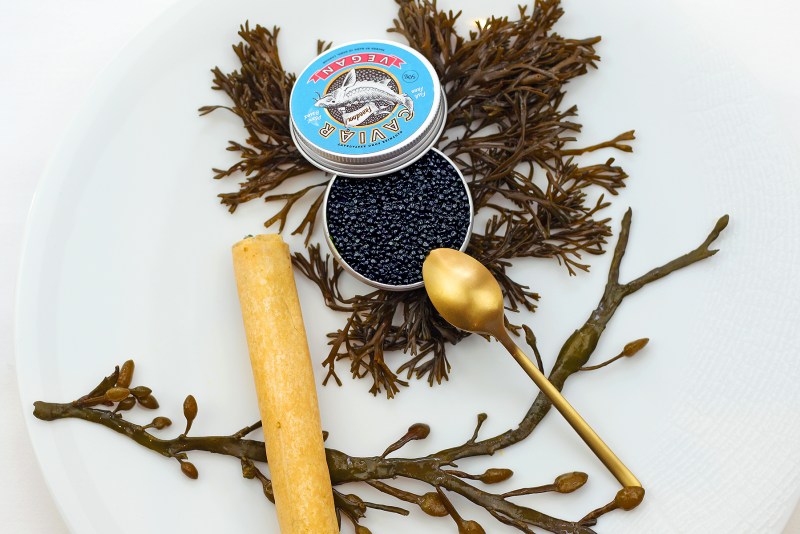 Alexis has pioneered vegan kelp caviar. Image credit: Gauthier Soho
Alexis has pioneered vegan kelp caviar. Image credit: Gauthier Soho
Although many recognise the suffering of animals, and the environmental consequences of their consumption, Alexis can see that some people simply “can’t stop eating animals”. Meat may be an addiction, but he still has hope for the future of veganism. Alexis is confident in “human ingenuity”, through the production of lab-grown meat – where cells are cultivated from animals that haven’t been farmed or slaughtered. “I dream about a future where people will feast on wagyu beef from the most amazing animals… living the best life in Japan,” Alexis explains. Having tried cultured foie gras and chicken skin, he believes that “it will taste delicious… and have the perfect texture”. It would be identical, if not superior to ordinary meat. The best part is that “nobody is dead”.
Lab grown meat is not without controversy, however. It has been banned in Italy in defence of tradition and farming, and some vegan purists still consider it morally unacceptable. “Refusing to look at the future… is very much the makeup of the human in general,” Alexis tells me. Citing vaccinations, he notes that it is typical for humanity to oppose beneficial technological innovation. The motivation of upholding tradition and barring meat from a slaughter-free alternative appears sadistic to Alexis. “Sometimes I despair,” Alexis confides, with a quiet intensity. He cannot comprehend the mentality of others.
“I dream about a future where people will feast on wagyu beef from the most amazing animals… living the best life in Japan”
Amid this melancholy, I was curious to explore Alexis’ outlook on the future of plant-based gastronomy. “We are never going to convince… people who are hard to convince unless the alternative we are serving is as delicious if not more delicious than what they are used to,” he explains. Young chefs who “do it for the animals” are instrumental in expanding the circle of moral worth, Alexis feels. By a domino effect of chef-inspiring-chef, plant-based cuisine will become more widespread. Such a process, Alexis is adamant, is the “normal human progression to being more perfect”.
At his core, Alexis is optimistic for the future of humanity and its relationship with animals. His worldview is grounded not in his hatred of meat consumption, but his love for life. He sees veganism not as a mere lifestyle choice, but as a self-evident moral imperative – it is a tide that will eventually sweep us all away. “One day, there will be a town where there will be a lot of delicious restaurants, but none of them will be serving animals,” he dreams. The attribute that struck me the most was Alexis’ unwavering integrity; the risk of his business choices cannot be understated, but his conscience would not permit otherwise. He came out on top.
Alexis has since opened 123V, a vegan sushi restaurant, and Studio Gauthier, where people may enjoy Alexis’ vegan cuisine “in a more relaxed setting”. He now uses his social media presence – having amassed over a quarter-of-a-million Instagram followers – “to call out the absurdity of other people” and pursue his mission of love.
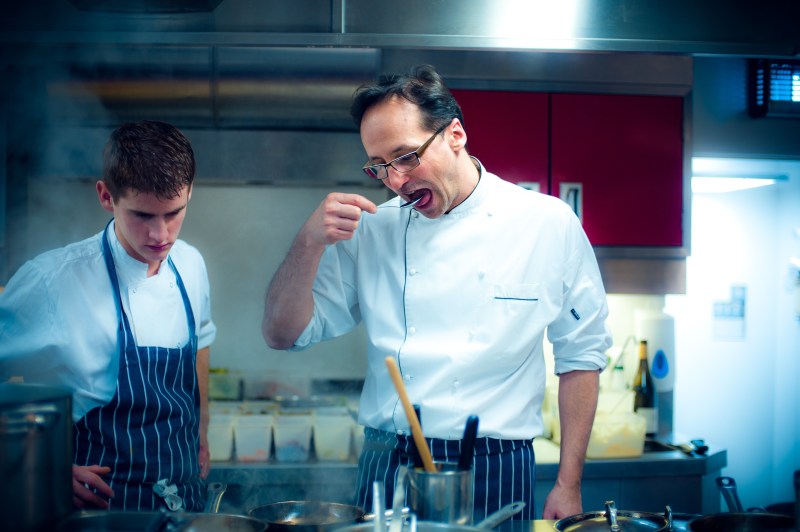 No longer formatted by tradition, Alexis’ vegan innovation knows no bounds. Image credit: Gauthier Soho
No longer formatted by tradition, Alexis’ vegan innovation knows no bounds. Image credit: Gauthier Soho
My encounter with Alexis left me with a sour taste in my mouth. Leaving Gauthier Soho, I set off on a contemplative pace around the capital for five miles. Upon settling in a McDonalds, I dug into a compensatory McPlant – which, I must add, successfully replicates and thereby makes redundant its meaty alternative. In it I found no solace; such an indulgence does not really absolve anyone. I began to reflect on my own morality and internal speciesism.
Was I simply a moron… or was I a monster?
Alexis’ Instagram



Dining and Cooking